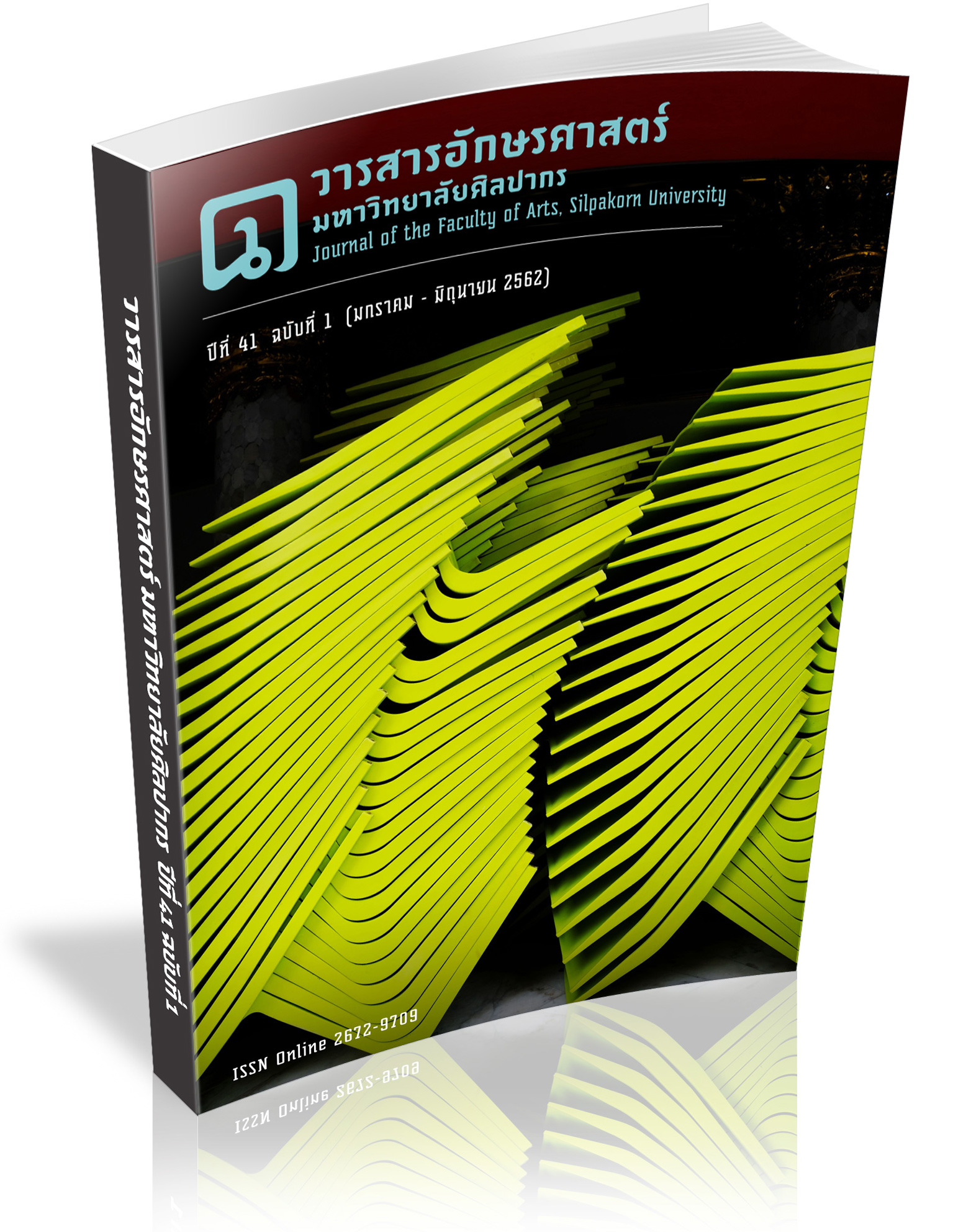Habit, or /nísǎj/
A Study of The Conceptual Metaphor in Thai National Corpus based on Cognitive Semantics and Pragmatics
Keywords:
Habit, Metaphor, Conceptual Metaphor, Pragmatics, Cognitive SemanticsAbstract
This article examines the conceptual metaphor of habit, or /nísǎj/ in Thai, using a conceptual metaphor approach, and studies functions. The data were randomly collected from academic works, non-academic works, fiction, newspaper items and miscellany in the Thai National Corpus program of the Department of Linguistics, Faculty of Arts, Chulalongkorn University. It was found that the metaphorical expressions show the metaphorical concepts such as [HABIT IS AN OBJECT], [HABIT IS A BUILDING], [HABIT IS A PLANT], [HABIT IS A SEWAGE], [HABIT IS A PUZZLE], [HABIT IS A TEXT BOOK], [HABIT IS AN ENEMY] These concepts represent their functions, namely function and ideational function that explain the abstract meanings of the habits to be more concrete in meaning. Another function is an interpersonal function that determines the perspective of habit to convince people to avoid unwanted habits.
Downloads
References
Kaewjungate, W. (2012). Human Passion,or /kìlèet/: A Study of Conceptual Metaphor in Thai. Retrieved from https://tci-thaijo.org/index.php/abc/article/view/54110/44912.(In Thai)
Klinnamhom, R. (2008). Metaphors used by Thai politicians : a cognitive semantics and pragmatic study. Doctoral Dissertation, Ph.D. Thai Language, Chulalongkorn University, Thailand. (In Thai)
Kövecse, Z. (2002). Metaphor : A Practical Introduction. New York: Oxford University Press.
Lakoff, J.& Johnson, M.(1980). Metaphors We Live By. Chicago: The University of Chicago Press.
Obpat, P. (2009). Metaphors about Life in Dharma Books. Master Dissertation, M.A. Thai Language, Chulalongkorn University, Thailand. (In Thai)
Panpothong, N. (2013). Critical Discourse Analysis based on linguistics. Bangkok: Faculty of Arts, Chulalongkorn University. (In Thai)
Petchkij, W. (2008). A Cognitive and Pragmatic Study of Cancer Metaphors in Thai. Doctoral Dissertation, Ph.D. Linguistics, Chulalongkorn University, Thailand. (In Thai)
Phakdeephasook, S. (2018). The Relationship between Linguistic Devices and Identity, and the Approach of Thai Language Study. Bangkok: Chulalongkorn University Press. (In Thai)
Phichitphongphao, S., (2010). Life Metaphor in How-To Books: A Study of the Relation between Language and Concepts. Master Dissertation, M.A. Thai Language, Chulalongkorn University, Thailand. (In Thai)
Royal Society of Thailand. (2013). Royal Institute Dictionary. Royal Society of Thailand version. Bangkok: Nanmeebooks. (In Thai)
Tawichai, S. (2006). Conceptual Metaphors of Anger in Thai. Master Dissertation, M.A. Thai Language, Silpakorn University, Thailand. (In Thai)
Wisalo, P. (2009). Freedom in My Heart. Retrieved from http://www.openbase.in.th/node/10989. (In Thai)
Wongthai, N. (2012). Conceptual metaphors of death in Thai. Retrieved from http://www.lc.mahidol.ac.th/lcjournal/FullPaper/JLC31-1-Nuntana-WT.pdf.
Wongthai, N. (2011). Synaesthetic Metaphors in Thai: A Cognitive Linguistic Study. Master Dissertation, M.A. Linguistics, Thammasat University, Thailand. (In Thai)
Downloads
Published
How to Cite
Issue
Section
License
ผู้เขียนบทความต้องยินยอมในข้อกำหนดต่าง ๆ ของวารสารก่อนส่งบทความตีพิมพ์



